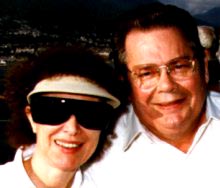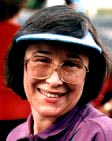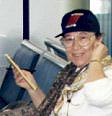|
This list kept growing as I learned to live in an evermore blurry world.
My parents taught me to improvise and figure out how to make things work. After I got past all the disbelief and anger of my situation, I got busy. At the first stage when the glare hit, I had an anti-reflective coating put on my glasses and learned that the biggest plastic frames gave my eyes more comfort (didn't do a thing for my image). A slight tint put in my lenses, darker at the top, helped, and I collected visors to go with any outfit. People thought I just came from playing tennis! I discovered the big plastic wrap-around sunglasses, and I furthered modified them so light couldn't enter at the top. I might leave the house without my purse or lipstick, but not without my sunglasses. They fit right over my regular glasses. I beat up my sunglasses and had them scratched many times, and as I bought new ones I discovered that the ones with grey tint, rather than green or brown tint, made the color red stand out better (important for driving!) Here are my various eye regalia:   
Visors became less crucial as the years went by, but I always took one on trips (those little lights above your seat on an airplane are murder!). Any walking or driving into the sun (even walking the dog) could be devastating without at least a visor or brimmed hat. Despite the glare problems, I could still drive, but I soon avoided the freeway, where many sets of bright headlights would mesh into one bright glare. (I'd like to outlaw halogen headlights!) I drove surface streets well if I was familiar with the area. I looked for less-traveled streets to avoid headlights behind me. Of course when it became difficult to see red stopsigns or to tell if the light at an intersection was red or green, I quit driving. The way I coped with that is that my husband went into partnership with me on my job, and he does the driving to appointments. I quit going to football games, with their many bright lights shining across the stadium. That didn't break my heart at all. When my eyes got bad enough that the doctor couldn't improve my vision with a prescriptive lense any more I had a chance to get more creative. One too many mornings of not being able to figure out which was what in my undies drawer got me very organized! I now have everything in its own place. Left side of drawer is this, right side is that. No more surprises! (Should've done it years ago, anyway!) Because my eyes are their very worst in the morning, I sometimes need to use my sense of touch and look for seams or hems to be sure I don't have any clothes on inside out. My husband also keeps an eye on me before I appear in "public." I do find that makeup, jewelry, and nail trimming and polishing are very difficult things to accomplish. However, speaking of nail polish, something bright red to mark telephone buttons, where the nozzle is on the hairspray can, and where the start control is on the washer and dryer is invaluable. My job is lots of paperwork and files and phone calls. I bought the type of phone I can bring the handset right up to my nose to see the numbers to dial. Every file folder is labeled using a marker pen. I'm only at the medium-point now. Pencils are useless. I can't see those little grey lines. A black felt pen and yellow notes or tablets do the job. Everybody's phone number gets written large inside the front of their file folder, always in the same place. Organizing the office: it's got to be put back where I know exactly where to expect to find it. I can't see white-on-white, so for a job like sticking labels on postcards, I use a dark desk surface so I can distinguish the edges of the card and avoid labels that are crooked or off the edge. Walking around assistance: If the light is behind me or I'm going up the stairs, I do much better. If the light is in my eyes and I think there may be even a chance of a step-down, I take it very carefully. If my husband is with me, I just walk behind him, and if he steps down, so do I. I went through a lot of depression and anger about my vision for awhile. I always loved to garden. Once I realized I wasn't going to be able to see things so well (beauty or bugs), I learned to scan flowers from the garden so I can enlarge them and enjoy the view. And I decided that my new plants will be fragrant. I can still take my evening walk in the yard, even if I must sniff my way along. Here's one little view from my garden for your pleasure.  If you're reading this, you probably do something
with a computer. The best advice I ever got about my computer was to get the largest monitor I could afford. There are ways you can boost up the print size or contrast at your computer, too. Visit our Fuchs' Home page for Computer Viewing Tips When I first wake up and my vision is blurry, I turn on my computer, boost up the print, and start to work. There is something about looking at the monitor that clears up my eyes faster than using a hairdryer held at arm's length, or waiting until noon for my eyes to clear up. My vision now is 20/50 in my good eye and 20/80 in the bad one. My doctor says when I can no longer do the normal things in life, it will be time to consider the transplant. I guess things are not too "unnormal" yet. Technology is improving, and that is an encouraging thing because Fuchs' patients can have their vision restored by corneal transplant. But while one is waiting, one needs a positive attutude and a sense of humor. It's a good thing to wake up with blurry vision and know that you may be able to see better in an hour or two, and that tomorrow you might be able to see all day long. All the people I have met through this website have different symptoms, and they have their own "bag of tricks" to help them get along. Here's a summary of the tricks used by members of my support group, Fuchs' Friends: For the glarey days, most use wraparound sunglasses in grey or amber shades, and some here swear by polarized. Many have an anti-reflective coating on their glasses. Sunvisors and baseball caps help, too. Try to arrange your driving to go AWAY FROM the direction of sunrise and sunset each day. For the foggies, some find it helpful to sleep with the head elevated instead of flat, or to sleep fewer hours, or get up earlier so the foggies can clear a bit. Allergies can make the foggies kick up, and so some members used Claritin for that and then swear it helped reduce the foggies. Humid days will aggravate the fog, and so will crying. And quite a few of us are convinced that extra stress has increased our fogginess. One day I started out to drive quite clear, got lost in traffic, and everything fogged over so bad I had to pull into a parking and call hubby on my cellphone to come lead me home!
CLICK ON "REQUEST
TO JOIN"!

Back to
Page updated July 15, 2005, by Dorothy
Original Graphics copyright Dorothy Acton
All rights reserved
Commonlaw Copyright 2002 - D.Acton All rights reserved. No part of this website may, for commercial, profit-making or other non-personal purposes, be reproduced in any form, or stored in a database or retrieval system, or transmitted or distributed in any form by any means, electronic, mechanical photocopying, recording or otherwise without prior written or electronic permission of the author. Submit all inquiries to said person via email to the site’s webmaster. |
|